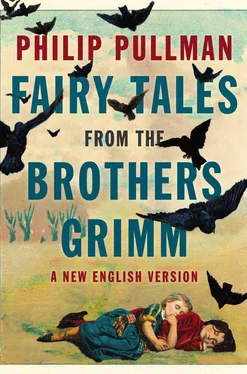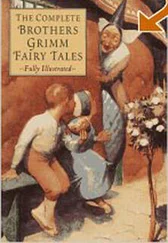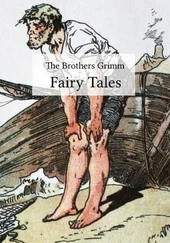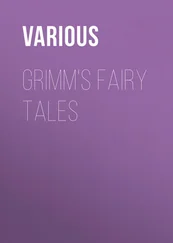Calvino’s version is full and inventive. I borrowed from him the suggestion that water alone wouldn’t be enough to get rid of seven years’ worth of dirt.
THIRTY-SEVEN
THE TWO TRAVELLING COMPANIONS
The mountain and the valley never meet, but the children of men, both good and bad, meet one another all the time. So it was that a shoemaker and a tailor once met up on their travels. The tailor was a good-looking little fellow, always cheerful and full of merriment. He saw the shoemaker coming towards him on the other side of the road, and, seeing from the shape of his knapsack what trade he followed, began to sing a teasing little song:
‘Sew the seam and pull the thread,
Whack the nail right on the head—’
But the shoemaker wasn’t the type to take a joke. He scowled and shook his fist. The tailor laughed and handed over his bottle of schnapps.
‘Here, take a swig of this,’ he said. ‘No harm intended. Have a drink and swallow your anger.’
The shoemaker knocked back half the bottle, and the storm in his eyes began to clear. He gave the bottle back and said, ‘Nice drop. They go on about heavy drinking, but they don’t say much about great thirst. Shall we travel together for a while?’
‘Suits me,’ said the tailor, ‘as long as you don’t mind making for the big towns, where there’s plenty of work.’
‘Just what I had in mind. There’s nothing to be earned in these small towns, and the country people prefer to go barefoot anyway.’
So on they went together, putting one foot in front of the other like weasels in the snow. They had plenty of time, but little to eat. Whenever they reached a town they looked for work, and because the tailor was an engaging little fellow with rosy red cheeks, he found work easily enough, and if he was lucky he got a kiss from the master’s daughter when he left, to wish him good cheer on the way.
Whenever he met up with the shoemaker again, it was always the tailor who had the most in his pocket. The shoemaker, an ill-tempered so-and-so, used to make a sour face and say, ‘The bigger the rascal, the better the luck.’
But the tailor only laughed and sang all the more, and shared what he had with his companion. Whenever he had a couple of coins in his pocket, he’d order something good to eat and thump the table till the glasses danced. ‘Easy come, easy go’ was his principle.
After they’d been travelling for some time, they came to a great forest. There were two paths that led through it to the capital, but one of them took two days’ walking and the other took seven, and they didn’t know which was which. They sat down beneath an oak tree and talked about it. Should they carry seven days’ food, or only two?
‘Always prepare for the worst,’ said the shoemaker. ‘I’m going to carry enough bread for a week.’
‘What?’ said the tailor. ‘Lug all that bread about like a beast of burden, and not be able to enjoy the scenery? Not me. I shall trust in God as I always do. My money’s as good in summer as in winter, but bread isn’t — in the hot weather it dries out and goes mouldy all the quicker. Why shouldn’t we find the right way? A one-in-two chance is pretty good, when you think about it. No, I’ll take bread for two days, that’s quite enough.’
So they each bought the bread they wanted to carry, and set off into the forest. It was as quiet as a church under the trees. There was no breeze, no murmuring brook, no birdsong, and not a single sunbeam found its way through the dense leaves. The shoemaker didn’t say a word. He just trudged on with the bread weighing heavier and heavier on his back, and the sweat streaming down his sour and gloomy face.
The tailor, however, couldn’t have been happier. He laughed and sang and walked ahead with a spring in his step, whistling on a blade of grass. He thought, ‘God up there must be pleased to see me so happy.’
And so they went on for two days. On the third day, though, they were still deep in the forest, and the tailor had eaten all his bread. He was a bit less cheerful now, but he didn’t lose courage; he relied on God and on his luck. On the evening of the third day he lay down hungry, and rose even hungrier the following morning. The fourth day passed in the same way, and in the evening the tailor had to sit and watch as the shoemaker made a fine meal out of his supplies.
The tailor asked for a slice of bread, and the shoemaker just laughed at him, saying, ‘You were always too fond of singing and playing the fool. Now you can see where that gets you. Birds that sing too early in the morning get caught by the hawk before nightfall.’
In fact, he was merciless. On the fifth morning the poor tailor could hardly stand up and his voice was just a croak. All the red in his cheeks had gone; they were as white as chalk now, and it was his eyes that were red.
And then the shoemaker said, ‘Well, you’re in trouble, and it was all of your own making. I tell you what — I’ll give you a piece of bread. But in return, I’ll put out your right eye.’
The poor tailor had to live, so he had to agree. He wept with both eyes while he still had them, and then held up his head so the stony-hearted shoemaker could put out his right eye with the breadknife. The tailor remembered what his mother had said when she found him gobbling up a pie in the pantry: ‘Eat all you can, and suffer what you must.’
He ate the thin slice of bread the shoemaker gave him, and felt a little better, and was able to stand up; and he walked on thinking that he could still see well enough with his left eye, after all.
But on the sixth day the hunger had him in its grip again, and even more fiercely than before. That evening he simply fell down and lay where he fell, and on the seventh morning he was too weak to get up at all. His death was not far away.
The shoemaker said, ‘I’ll be merciful. I can see the state you’re in, and I’ll give you another slice of bread. But you’re not getting it for nothing. You’ve got one eye left, and I’ll have that one like the first.’
The poor tailor felt as if he’d wasted all his life. What had he done wrong, that he should come to this? He must have offended God in some way, so he prayed for forgiveness, and said to the shoemaker, ‘Go on then. Put it out. But remember, God sees everything you do, and the time will come when he’ll punish you for this evil deed. When times were good, didn’t I share what I had with you? One stitch follows another, and I used to see them clear and easy, but if I haven’t got my eyes and I can’t sew any more, I’ll have to go begging. At least don’t leave me here alone when I’m blind, or I’ll die of hunger.’
The shoemaker cared nothing for this talk of God; he’d driven God out of his heart a long time ago. He took his knife and put out the tailor’s other eye, and then gave him a small piece of bread, held out his stick for the tailor to hold on to, and led him along.
At sunset they came out of the forest. The tailor could feel the warmth of the sun on his face, but of course he couldn’t see a thing, and he didn’t realize that the shoemaker was leading him towards a gallows that stood at the edge of a field. The shoemaker left him there alone and walked on. The poor tailor, overcome by weariness, pain and hunger, simply fell down where he was and fell asleep.
He woke up at dawn, shivering with cold. There were two poor sinners hanging on the gallows above him, with a crow sitting on the head of each one.
One of the hanged men spoke to the other, saying, ‘Brother? Are you awake?’
‘Yes, I’m awake,’ said the second.
‘Well, I’ll tell you something worth knowing. The dew that settles on us at night and drips off on to the grass below has a special property. If a blind person washes their eyes in it, they get their sight back. If the blind knew that, how many d’you think there’d be crowding around our gallows every morning?’
Читать дальше












